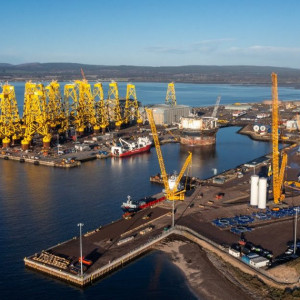Inverness and Cromarty Firth Freeport gets custom site designation


Inverness and Cromarty Firth Green Freeport (ICFGF) has been awarded customs site status. The designation, granted by HMRC after an audit and verification process, provides incentives that should pave the way for greater volumes of heavy engineering components, such as offshore wind foundations, manufactured cables, wind turbine generators and fabricated steel structures, to pass through the port. A customs site is a designated area within the green freeport that sits outside the UK's normal customs rules.
It benefits from simplified processes and reduced costs associated with handling goods to and from the area, making it more attractive to current users and those looking to invest. ICFGF needed to have at least one operational customs site to enable the Scottish and UK governments to approve its full business case. That final phase in the administrative process is now expected to happen within a matter of weeks.
Port of Nigg on the Cromarty Firth, operated by Global Energy Group - which is one of the freeport's founding partners - was selected as the first candidate to apply for the status, due to its existing processes for security and cargo handling. Along with the designation of special tax sites that provide incentives to businesses in the freeport, the custom site status was a critical factor in attracting Sumitomo Electric to Port of Nigg. The company is currently constructing a GBP350m subsea cable manufacturing plant there that should create more than 150 local jobs.
Calum MacPherson, chief executive of ICFGF, explained: "The port was required to show that it could meet stringent criteria as an operator, including on site audits conducted by HMRC to review security measures, inventory control processes and operating procedures. "These criteria will be regularly reviewed by HMRC. "The work and lessons learned will benefit other organisations within the green freeport that want to become customs sites.
"Our ports do not handle small consumer goods, so we will not see - for example - transit of large volumes of food and drink," he continued, adding: "Where our ports excel is in the handling of heavy engineering components for the energy sector, and this status significantly raises our potential as a major European hub for offshore wind and renewable energy technologies." Rory Gunn, facilities director at Port of Nigg, said: "As a large and established hub facility within the energy industry, the customs site status will further enhance our competitiveness, especially in the offshore renewables sector. "It will enable us to attract new opportunities and provide benefits to our existing and future clients.
"In the future, we hope that more components for the energy industry will be manufactured and moved through the port and make use of the customs site benefits. "The customs site status, coupled with the tax site benefits, will make the Port of Nigg a very attractive place for investment and businesses to locate, which in turn creates local jobs and opportunities." Businesses using the customs site get duty suspension of imported goods, providing they are not imported into the wider UK after leaving the port.
Additionally, there are no export duties on products going into use in British waters outside a 12-mile territorial limit or to countries overseas.
It is also possible to store equipment and cargo at the port for long durations without incurring duties, and businesses can use a simplified administrative procedure for documenting the import and export of goods.
Don't miss the latest headlines with our twice-daily newsletter - sign up here for free.[1]
References
- ^ sign up here for free (www.insider.co.uk)